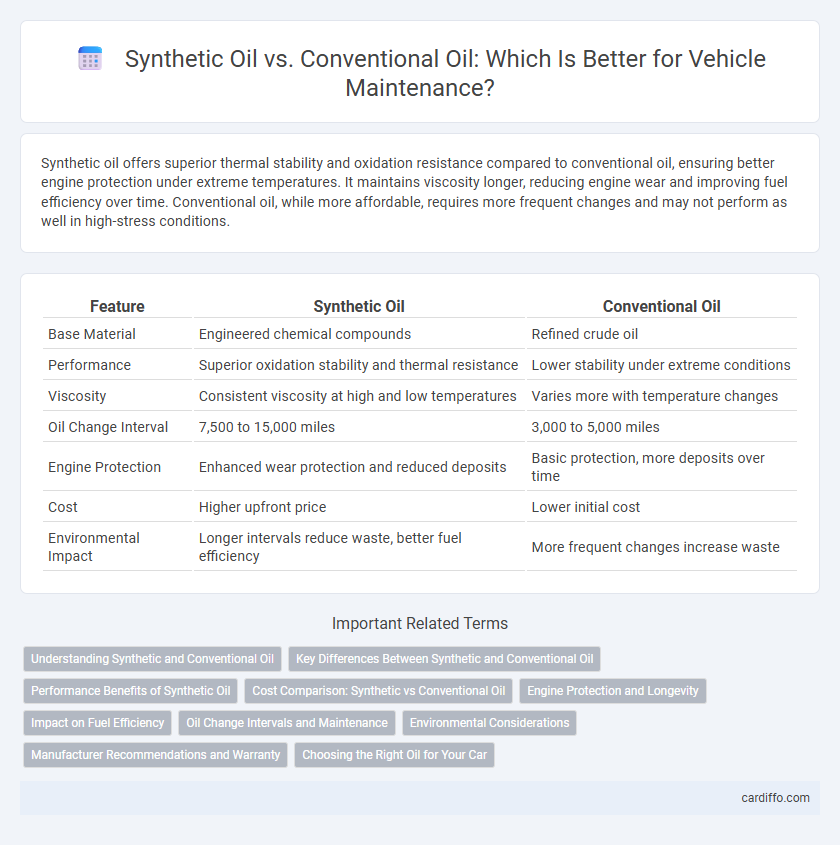Synthetic oil offers superior thermal stability and oxidation resistance compared to conventional oil, ensuring better engine protection under extreme temperatures. It maintains viscosity longer, reducing engine wear and improving fuel efficiency over time. Conventional oil, while more affordable, requires more frequent changes and may not perform as well in high-stress conditions.
Table of Comparison
| Feature | Synthetic Oil | Conventional Oil |
|---|---|---|
| Base Material | Engineered chemical compounds | Refined crude oil |
| Performance | Superior oxidation stability and thermal resistance | Lower stability under extreme conditions |
| Viscosity | Consistent viscosity at high and low temperatures | Varies more with temperature changes |
| Oil Change Interval | 7,500 to 15,000 miles | 3,000 to 5,000 miles |
| Engine Protection | Enhanced wear protection and reduced deposits | Basic protection, more deposits over time |
| Cost | Higher upfront price | Lower initial cost |
| Environmental Impact | Longer intervals reduce waste, better fuel efficiency | More frequent changes increase waste |
Understanding Synthetic and Conventional Oil
Synthetic oil consists of chemically engineered base oils combined with additives, designed to provide superior engine protection, better viscosity stability, and enhanced performance under extreme temperatures compared to conventional oil. Conventional oil, refined from crude oil, contains natural impurities and offers reliable lubrication but typically requires more frequent changes due to faster breakdown and sludge formation. Understanding the differences in molecular structure and additive packages helps vehicle owners select the optimal oil type to maximize engine longevity and efficiency.
Key Differences Between Synthetic and Conventional Oil
Synthetic oil offers superior viscosity stability and thermal resistance compared to conventional oil, resulting in enhanced engine protection and performance under extreme temperatures. It contains fewer impurities and provides better lubrication, reducing engine wear and extending oil change intervals. Conventional oil, derived from crude oil, is less refined and may break down faster, necessitating more frequent replacements.
Performance Benefits of Synthetic Oil
Synthetic oil provides superior engine performance by maintaining optimal viscosity at extreme temperatures, reducing engine wear and improving fuel efficiency. Its advanced formulation offers enhanced thermal stability and oxidation resistance, extending oil change intervals and protecting engine components. Compared to conventional oil, synthetic oil ensures smoother engine operation and better overall durability, especially in high-stress driving conditions.
Cost Comparison: Synthetic vs Conventional Oil
Synthetic oil typically costs between $60 and $100 per 5-quart change, while conventional oil ranges from $25 to $50 for the same amount. Despite the higher upfront price, synthetic oil offers longer intervals between changes, often extending from 7,500 to 15,000 miles compared to conventional oil's 3,000 to 5,000 miles. This extended longevity can offset the initial cost difference, resulting in potentially lower overall maintenance expenses over time.
Engine Protection and Longevity
Synthetic oil offers superior engine protection compared to conventional oil due to its enhanced viscosity stability, reduced oxidation, and improved thermal resistance. These synthetic formulations minimize sludge and deposit formation, extending engine life by maintaining cleaner internal components. Engine longevity is significantly improved with synthetic oil through better wear resistance and consistent lubrication under extreme temperature and pressure conditions.
Impact on Fuel Efficiency
Synthetic oil enhances fuel efficiency by reducing engine friction more effectively than conventional oil, resulting in smoother engine operation and improved mileage. Its advanced formulation maintains optimal viscosity under extreme temperatures, ensuring consistent lubrication and minimizing energy loss. Vehicles running on synthetic oil typically experience up to a 2-3% increase in fuel economy compared to those using conventional oil.
Oil Change Intervals and Maintenance
Synthetic oil typically allows for longer oil change intervals, often ranging from 7,500 to 15,000 miles, compared to conventional oil which generally requires changes every 3,000 to 5,000 miles. Its advanced formulation provides better thermal stability and resistance to oxidation, reducing sludge buildup and engine wear. Regular maintenance schedules leveraging synthetic oil can enhance engine longevity and improve fuel efficiency by maintaining optimal lubrication under extreme conditions.
Environmental Considerations
Synthetic oil offers superior environmental benefits compared to conventional oil by lasting longer and reducing the frequency of oil changes, which decreases overall oil consumption and waste. Its advanced formulation enhances engine efficiency, leading to lower emissions and better fuel economy. Choosing synthetic oil supports sustainability efforts by minimizing the ecological footprint associated with oil extraction and disposal.
Manufacturer Recommendations and Warranty
Manufacturer recommendations emphasize using synthetic oil for enhanced engine protection, improved temperature stability, and extended oil change intervals, which helps preserve warranty validity. Conventional oil may be suitable for older or less demanding engines but could lead to increased wear and potential warranty complications if used against specified guidelines. Following the vehicle manufacturer's oil specifications ensures compliance with warranty requirements and optimal engine performance.
Choosing the Right Oil for Your Car
Choosing the right oil for your car depends on factors like driving conditions, engine type, and manufacturer recommendations. Synthetic oil offers superior performance by providing better protection against engine wear, higher resistance to oxidation, and improved viscosity at extreme temperatures compared to conventional oil. Understanding your vehicle's requirements and maintenance schedule ensures optimal engine health and fuel efficiency.
Synthetic Oil vs Conventional Oil Infographic

 cardiffo.com
cardiffo.com